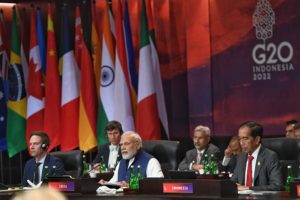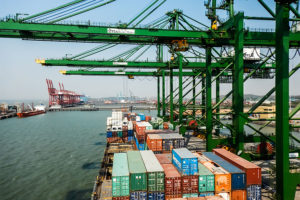COVID-19 has re-emphasised that plastic by itself is not a problem
Sourabh Manuja, Fellow, The Energy and Resources Institute (TERI), opines that though, there are numerous advantages of plastics in this pandemic era, we must not forget the consequences of growing plastic pollution on land and environment. Nevertheless, the solution is not to move towards ‘plastic less’; rather we should move towards a ‘less plastic’ environment.

IBT: How has the onset of COVID-19 and the consequent use of plastics in the healthcare industry backtracked India’s decision to ban single use plastic?
Sourabh Manuja: Plastic, by virtue of its mechanical and chemical properties, is a versatile substance and has various benefits in our modern society. The usage of plastics for personal protective equipment in the face of COVID-19 has re-emphasised that plastic by itself is not a problem. Though, there are numerous advantages of having plastics in this pandemic era, we must not forget the consequences of growing plastic pollution on land and environment.
Studies by the United Nations Environment Programme (UNEP) have established that on a global scale, 80% of litter in oceans originates from land-based activities and about 90% of this is plastic waste — mostly single-use plastic. The commitment to ban single use plastic in the years to come, which was reiterated at the UNCCD COP 14 in 2019, showcased the issues India has with growing plastic pollution. There is still a strong need to address the challenges in management of plastics, particularly single use plastics and at the same time realize that around 1.2 million people are employed with plastic manufacturing sector, directly and indirectly.
IBT: What is the current usage of plastics in India’s healthcare industry and growth projections this year?
Sourabh Manuja: Plastics have revolutionized modern healthcare industry and proved to be a vital material. Currently, protective suits, face masks, face shields, shoe and head cover, eye glasses, and even gloves are made of plastics, as they do not allow transmission of virus through their layers. It is also reported that Indian MSMEs are producing close to 0.5 million PPE kits per day, and the day is not far when we will be the largest exporter of PPE kits.
Plastics as a material are used for medical device packaging, medical components, orthopedic implant packaging, orthopedic soft goods, wound care and other implants. It is estimated that India medical plastics market size, which was US$ 522.3 million in 2016 is expected to reach US$ 931.7 million by 2025 at a CAGR of 6.7%. The growth is mainly due to the advent of advanced engineered plastics and plastic composites used in medical components, such as catheters, surgical instrument handles, and syringes.
IBT: Can we achieve a circular economy for plastics at a time when oil prices have plummeted globally leading to a decrease in the value of plastics?
Sourabh Manuja: In the wake of COVID-19, global crude oil prices have gone down as nationwide lockdowns were enforced across the world. The prices of crude oil, which were at Rs 4,399.91 per barrel in January 2020, dropped to Rs 1,603 per barrel in April 2020, and are at around Rs 3,060 per barrel in the middle of July 2020. We saw how such an essential commodity became less valuable due to a sudden demand supply imbalance.
It is important to note that had the prices of petroleum products not been elevated by the Government of India, the economics around demand and usage of recycled plastics would have been disrupted. As virgin materials prices hike, in competition to lower down the prices of finished products, manufacturers use a higher percentage of recycled materials. Thus demand increases for recycled products. If there was no hike, we could have seen an imbalance where people could have not preferred using recycled products.
Recycling in developing countries are mostly driven by economics and thus, circular economy loops are susceptible of getting disrupted in such economic shock scenarios. Only with strong policies, strict implementations and appropriate infrastructure, a circular economy can be achieved.
IBT: What eco-friendlier alternatives can the industry resort to in order to curtail the use of plastics like Polypropylene which is used to make PPEs? How can the domestic industry be incentivised to manufacture cleaner substitutes to these?
Sourabh Manuja: Well, we can say we should move to less plastic scenarios rather than plastic less scenarios. There are alternatives like cloth masks, reusable washable gowns made of cotton blended fabrics etc. for general public. There is a need to generate awareness among public that N95 masks, face shields, PPE suits etc. are for those who are in high alert zones or suspected COVID-19 positive cases.
Regarding incentivising domestic industry to manufacture cleaner alternatives, will it really help? It would be much better if alternate materials, which are reusable and produce less waste, are better marketed, by linking them through e-commerce platforms and promoting their usage. Textile waste from industries can also be linked up with manufacturers to help them produce low value and competitive protective gears. Further, there is a need to implement the first 3 R’s of waste management – Reduce, Reuse and Recycle – for whatever alternate we have and do our best to achieve zero waste cities.
IBT: Are biomedical waste management firms in the country ready to handle the extremely hazardous heaps of biomedical waste that our country is going to generate?
Sourabh Manuja: This is an interesting question. We have been raising this concern that with around 200,000 tonnes of BMW generated in 2017, we were able to process only 78% at common biomedical waste treatment facilities (CBMWTFs). Assocham and Velocity study indicates we might produce 283,057 tonnes of BMW by 2022. During this COVID-19 scenario, the expected BMW is projected to shoot up with increasing number of cases. There is a danger that we might end up dumping BMW at our landfills/dumpsites. Though government organisations in India are putting in their best and have even recently published guidelines for quarantine facilities, yet we lack capacities to handle BMW which might shoot as much as 6 times, as seen in Wuhan during the peak of pandemic.
IBT: What impact will the lack of improper disposal of biomedical waste have on the ecosystem? What can be done to check the harmful effects of biomedical waste on the environment?
Sourabh Manuja: The impacts of improper disposal of bio medical waste (BMW) can be seen on land, water and even air. This improper disposal can even lead to several diseases like Hepatitis B and D, Dengue, AIDS, Japanese encephalitis, tick fever etc among people. We even fear spread of COVID-19 virus with unmanaged BMW around cities.
To check the harmful effects of BMW on environment, we need to ensure that waste is properly managed via CBMWTFs and captive BMW handling units at Health Care Facilities (HCF). We also need to ensure that appropriate monitoring, review and verification systems are in place and all waste streams generated are managed appropriately as per the guidelines given by government from time to time.
For cities or villages which do not have linkage to CBMWTFs or captive BMW handling units at HCFs, guidelines given under Bio-medical Waste Management Rules of 2016 for disinfection and appropriate deep burial should be followed. International Solid Waste Association (ISWA) has also responded on management of BMW during COVID-19 outbreak and TERI has also come up with guidance to manage waste in such areas.

Sourabh Manuja is a fellow at The Energy and Resources Institute (TERI), working in the field or research, education, and consulting in waste management domain. He is primarily responsible for managing projects as a project in charge and handles team members working under the project to fulfil its objectives in a time bound manner. Having around 15 years of work experience, he is an international expert in waste management domain and well renowned for his contribution in the akin domain amongst the media. He did many first of its kind of projects ranging from emission modelling for country, audits for urban local bodies and formulation of work plans to reduce short lived climate pollutants for waste management activities. He was also awarded ‘Gold Medal’ by The Honorable President of India for his overall academic performance in post-graduation from a renowned institution Jamia Millia Islamia, which he pursued while continuing his job. Being an environmental activist by choice and environmental engineer by qualification, his vision to serve the mother earth and achieve sustainable development across waste management domain, drives his passion.
He has published 33 research papers in various journals, seminars and conferences and has had written numerous newspapers and magazines articles. He has also authored chapters in five different books.













Your statement – “There is a need to generate awareness among public that N95 masks, face shields, PPE suits etc. are for those who are in high alert zones or suspected COVID-19 positive cases”, is very scaring and I feel you should refrain from it.
Thanks! “CDC Recommends Cloth Face Coverings for Use by the General Public”. The intention is to avoid unnecessary waste generation. The word “high alert zone” is strategically used to avoid any misleading perceptions. Thanks for your comment.